The 20th presidential election of Korea was held on March 9th. Many candidates campaigned during the election asserting their pledges, and the winner of the vote was Yoon Suk-yeol of the People Power Party. Yoon Suk-yeol was elected with 48.56% of the votes. With the election of Yoon Suk-yeol as the 20th president, a conservative government will lead for the next five years. How did the 20th presidential election proceed and what was the voter turnout? Let's take a look at the process with CAH.
How Did the 20th Presidential Election Take Place?
March 9th was the 20th presidential election day in Korea. Under the system of the 6th Republic of Korea[1], presidential elections were originally held in December from the 13th President Roh Tae-woo to the 18th President Park Geun-hye. However, after the Constitutional Court of Korea upheld the impeachment of former President Park Geun-hye on March 10th, 2017, the 19th presidential election was held on May 9th of that year. The 19th presidential election was the first by-election following the removal of the president in the history of constitutional politics in Korea. As President Moon Jae-in was elected in the 19th presidential election, he held a five-year term from May 10th, 2017, to May 9th, 2022. The term of the president elected in this 20th presidential election is 5 years, from May 10th, 2022, to May 9th, 2027. The election campaign period was 23 days from February 15th to March 9th, 2022.
Overseas voting was held from February 23rd to 28th, shipboard voting[2] was held from March 1st to 4th, and early voting was held from March 4th to 5th. On March 9th, Election Day, voting was held from 06:00 to 18:00 and people who were confirmed with COVID-19 voted from 18:00 to 19:30. The difference from previous presidential elections is that in this presidential election, votes were held for those who were diagnosed with COVID-19 and those who were in quarantine. As COVID-19 continues to spread, the number of confirmed cases is increasing. Quarantine measures were taken for those who were diagnosed with COVID-19, so the issue raised that voters' rights may be infringed. Accordingly, the amendment to the Public Official Election Act, which stipulates that COVID-19 confirmed and quarantined people can vote from 18:00 to 19:30, passed the plenary session of the National Assembly on February 14th. According to the amendment, those who have been in close contact with a confirmed COVID-19 patient, and are in self-quarantine, can participate in the presidential election with permission from the quarantine authorities.
In the 20th presidential election, the Republic of Korea National Election Commission’s poor election management caused a lot of controversies. On March 5th, the second day of early voting, there were several complaints at polling places across the country that the operation and management of early voting for COVID-19 confirmed people was being inappropriately performed. After the COVID-19 confirmed voters received ballot papers and envelopes, they voted in a separate place, and delivered the ballots to an election assistant. However, at this time, the ballot papers collected by the election assistants were stored poorly in shopping bags or baskets. In addition, ballot papers in which a specific candidate had already been voted on were distributed to voters at the polling place in Busan Metropolitan city Yeonje-gu. Criticism from the public continued that the method by which voters delivered their ballot papers to the election assistant instead of putting them directly into the ballot box violates the principles of direct and secret ballots stipulated in the Constitution of the Republic of Korea. On March 8th, Roh Jung-hee, chairman of the Republic of Korea National Election Commission made an apology, saying, "As the chairman, I deeply feel responsible and apologize for the confusion and inconvenience caused by insufficient preparation."
Candidates and Their Key Pledges
Candidate No.1 Lee Jae-myung of the Democratic Party of Korea
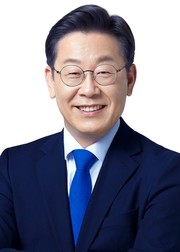
Candidate No.1 Lee Jae-myung of the Democratic Party of Korea is a lawyer turned politician who served as the 19th and 20th mayor of Seongnam and the 35th governor of Gyeonggi-do. Lee Jae-myung promised to spend a total of 50 trillion won to completely compensate citizens for the damage caused by COVID-19 to small businesses by canceling some of the debts incurred and reversing the credit rating downgrade. Regarding the real estate issue, Lee Jae-myung pledged to increase the housing supply with the goal of supplying 3.11 million units of both pre-sale and rental housing nationwide. To implement this, he promised to promote the reconstruction, redevelopment, and remodeling of the first new towns (Bundang in Seongnam City, Ilsan in Goyang City, Jungdong in Bucheon City, Pyeongchon in Anyang City, and Sanbon in Gunpo City). In addition, he presented the national basic income as a pledge and promised to provide all citizens with a basic income of 1 million won per year and about 80,000 won per month during his term in office. He also proposed to amend the constitution to a four-year two-term presidential term system, similar to that used in the United States.
Candidate No.2 Yoon Suk-yeol of the People Power Party
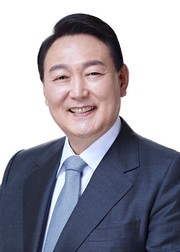
Candidate No.2 Yoon Suk-yeol of the People Power Party is a prosecutor turned politician who served as the 43rd Public Prosecutor General of the Supreme Prosecutor’s Office Republic of Korea. Yoon Suk-yeol also promised to support small businesses for the difficult two years of COVID-19 by investing 50 trillion won as a major pledge. Regarding the real estate issue, Yoon Suk-yeol pledged to increase the supply of housing with the goal of supplying more than 2.5 million units nationwide. To implement this, he also promised to activate the reconstruction, redevelopment, and remodeling of the first new towns, and to develop the station area and public land. The difference between Candidate Lee Jae-myung is that while Lee Jae-myung focuses on public-led supply, Yoon Suk-yeol focuses on private-led supply. In addition, Yoon Suk-yeol made a pledge to abolish the Ministry of Gender Equality and Family. He also proposed discontinuing use of the Blue House, the symbol of the imperial presidential system, and to build a new presidential office.
Candidate No.3 Sim Sang-jung of the Justice Party
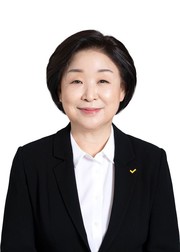
Candidate No.3 Sim Sang-jung of the Justice Party is the only district legislator of the Justice Party and is currently a legislator of the Gap(甲) District of Goyang-si. Candidate Sim Sang-jung promised to compensate the small businesses by expanding compensation for COVID-19 losses and compensating for rental losses as well as business losses. Regarding the real estate issue, unlike previous candidates, Sim Sang-jung offered the second land reform and strong regulation as a pledge to eradicate real estate inequality and speculation. She promised to introduce a housing cap that bans the ownership of more than three houses, strengthen the ownership tax, and guarantee tenants’ rights. She also proposed introducing an excess land tax, which is a tax levied to recover part of excess profits from privately-owned idle land and corporate-owned non-business land as tax. Although it has the advantage of realizing tax burden equity and distribution justice, it was abolished in 1998 to boost the economy. In addition, she pledged to complete legislation on a four-day workweek by 2027.
Unification of Candidates Yoon Suk-yeol and Ahn Cheol-soo
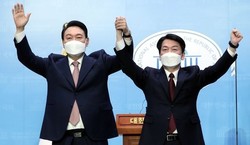
On March 3rd, Ahn Cheol-soo of the People's Party, declared an end to his candidacy, declaring unification with Candidate Yoon Suk-yeol. On the same day, the two candidates held a joint press conference announcing their unification and further announced that they would pursue a coalition after the election. Ahn Cheol-soo said that he had decided to unify for a “Better regime change.” On the 4th, he also mentioned on his social media, "I thought it was necessary to prevent a situation in which regime change could not be done." At a press conference, the two candidates announced that they would form a unified national government by discussing everything from the formation of the takeover committee to the formation of a joint government. However, since Ahn Cheol-soo declared unification after the overseas voting was over, the votes cast by overseas for Ahn Cheol-soo were disposed of as wasted votes. Therefore, a petition was posted saying that the “Ahn Cheol-soo Act” should be enacted to restrict the resignation of candidates after the overseas voting has ended in future elections.
Voter Turnout and Ratio of Approval Votes
The turnout in the 20th presidential election was 77.1%, with 34,067,853 voters. The turnout in early voting from March 4th to 5th was 36.93%, recording the highest turnout in early voting history. By region, Gwangju Metropolitan City had the highest turnout at 81.5% and Jeju had the lowest at 72.6%, with the Seoul Metropolitan Government at 77.9%. Yoon Suk-yeol received 48.56%, Lee Jae-myung got 47.83%, and Shim Sang-Jung received 2.37% of the vote. Specifically, the vote percentage by region is shown in the table below.
|
|
Lee Jae-myung |
Yoon Suk-yeol |
Shim Sang-jung |
|
Seoul |
45.73% |
50.56% |
2.80% |
|
Busan |
38.15% |
58.25% |
2.18% |
|
Daegu |
21.60% |
75.14% |
1.94% |
|
Incheon |
48.91% |
47.05% |
2.77% |
|
Gwangju |
84.82% |
12.72% |
1.51% |
|
Daejeon |
46.44% |
49.55% |
2.71% |
|
Ulsan |
40.79% |
54.41% |
2.92% |
|
Sejong |
51.91% |
44.14% |
2.94% |
|
Gyeonggi |
50.94% |
45.62% |
2.36% |
|
Gangwon |
41.72% |
54.18% |
2.48% |
|
Chungbuk |
45.12% |
50.67% |
2.62% |
|
Chungnam |
44.96% |
51.08% |
2.42% |
|
Jeonbuk |
82.98% |
14.42% |
1.58% |
|
Jeonnam |
86.10% |
11.44% |
1.28% |
|
Gyeongbuk |
23.80% |
72.76% |
1.88% |
|
Gyeongnam |
37.38% |
58.24% |
2.47% |
|
Jeju |
52.59% |
42.69% |
3.35% |
At the beginning of the ballot counting, Lee Jae-myung led Yoon Suk-yeol by a difference of 3-6% of the votes. However, as the counting progressed, the lead gradually decreased, and by the time the count reached 50%, Yoon Suk-yeol overtook Lee Jae-myung and ascended to first place. Yoon Suk-yeol was elected by a margin of only 0.8% of the vote. This was the result of winning by the narrowest percentage of votes in the history of the nation.
Yoon Suk-yeol is a candidate from the conservative camp. As a result, in the Yeongnam region (Busan, Ulsan, Daegu, Gyeongbuk, and Gyeongnam), where the traditionally conservative tendencies are strong, he obtained a greater percentage of votes than Lee Jae-myung, a candidate from the progressive camp. However, candidate Lee Jae-myung set a new record in Daegu (21.60%) and Gyeongbuk (23.80%) with the highest percentage of votes among progressive candidates in previous presidential elections. Conversely, in the Honam region (Gwangju, Jeonnam, Jeonbuk), where progressive voting tendencies are strong, Lee Jae-myung won more votes than Yoon Suk-yeol, but Yoon Suk-yeol also had the highest percentage of votes in previous presidential elections (Jeonnam: 11.44%, Jeonbuk: 14.42%, Gwangju: 12.72%). Yoon Suk-yeol won Seoul and Lee Jae-myung won Gyeonggi. Aside from regional political inclinations, it is worth noting that voters their 20s and 30s were polar opposites according to gender. In that age group, men supported Yoon Suk-yeol more, and women supported Lee Jae-myung more. According to exit polls from three terrestrial broadcasters, 58% of men in their 20s and younger supported Yoon Suk-yeol, and 58% of women supported Lee Jae-myung. In their 30s, 53% of men supported Yoon Suk-yeol, and 50% of women supported Lee Jae-myung. Experts interpret that the politicians strategically used “gender conflict” as a main topic during this election. Earlier, during the election period, Candidate Yoon Suk-yeol made customized promises targeting men in their 20s and 30s, such as abolishing the Ministry of Gender Equality and Family and strengthening punishment for false charges of sex crimes. The gender conflict of those in their 20s and 30s revealed through the presidential election poses an important task for the future government.
The 20th Presidential Election Winner, Yoon Suk-yeol of the People Power Party
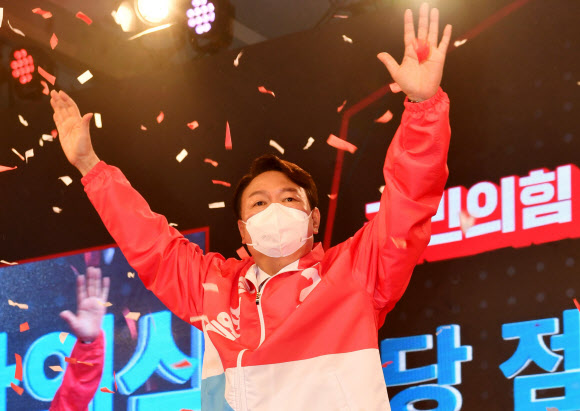
Candidate No.2 Yoon Suk-yeol of the People Power Party was elected in the 20th presidential election. Yoon Suk-yeol was born in Seoul in 1960 and completed his bachelor’s degree in Law from Seoul National University and his master’s degree from Seoul National University School of Law. From July 2019 to March 2021, he served as the 43rd Public Prosecutor General of the Supreme Prosecutor’s Office Republic of Korea. Yoon Suk-yeol resigned the Public Prosecutor General position in March 2021 and declared his run for president in June of the same year. After being elected in the 20th presidential election, on March 9th, he said, “I think it is a victory for the great citizens. Preparing for a new government as an elected candidate, when I officially take office, I will respect the spirit of the Constitution, respect congress, and cooperate with the opposition parties to take good care of the people.”
When the transition committee is formed, in-depth discussions and preparations are made about the presidential election promises of Yoon Suk-yeol. At this point, whether the promises made by Yoon Suk-yeol can be realized becomes an issue. In fact, it seems that many of the promises will have to go through the process of amending the law in order to be realized. When Yoon Suk-yeol takes office as the president, the opposition party will become the majority party. Currently, the Democratic Party of Korea has 172 seats (57.53%), the People Power Party has 110 seats (36.79%), the Justice Party has 6 seats (2.01%), and the People Party has 3 seats (1%). in the 22nd National Assembly. As the Democratic Party of Korea holds 172 seats, which is more than half, amendments to the law will be difficult to pass the National Assembly if the Democratic Party of Korea opposes them. Eventually, the realization of many of the promises requires the cooperation of the Democratic Party of Korea, and without cooperation, the realization of the promises may become impossible. In fact, the majority of the members of the Democratic Party of Korea oppose the abolition of the Ministry of Gender Equality and Family. Therefore, it is necessary to establish a “model of cooperation with the opposition party” in order to realize Yoon Suk- yeol's pledges in the midst of the opposition party.
Up to now, we have looked into how the 20th presidential election was held. While the president is the head of government, they are also the head of the state, Korea. The presidential election has a very direct impact on our lives. Did you vote in this presidential election? Even after the presidential election, the realization of pledges and the process of remediation problems that occurred during the election should be watched with great interest. CAH hopes that Yoon Suk-yeol will lead Korea in the right direction during his term.

